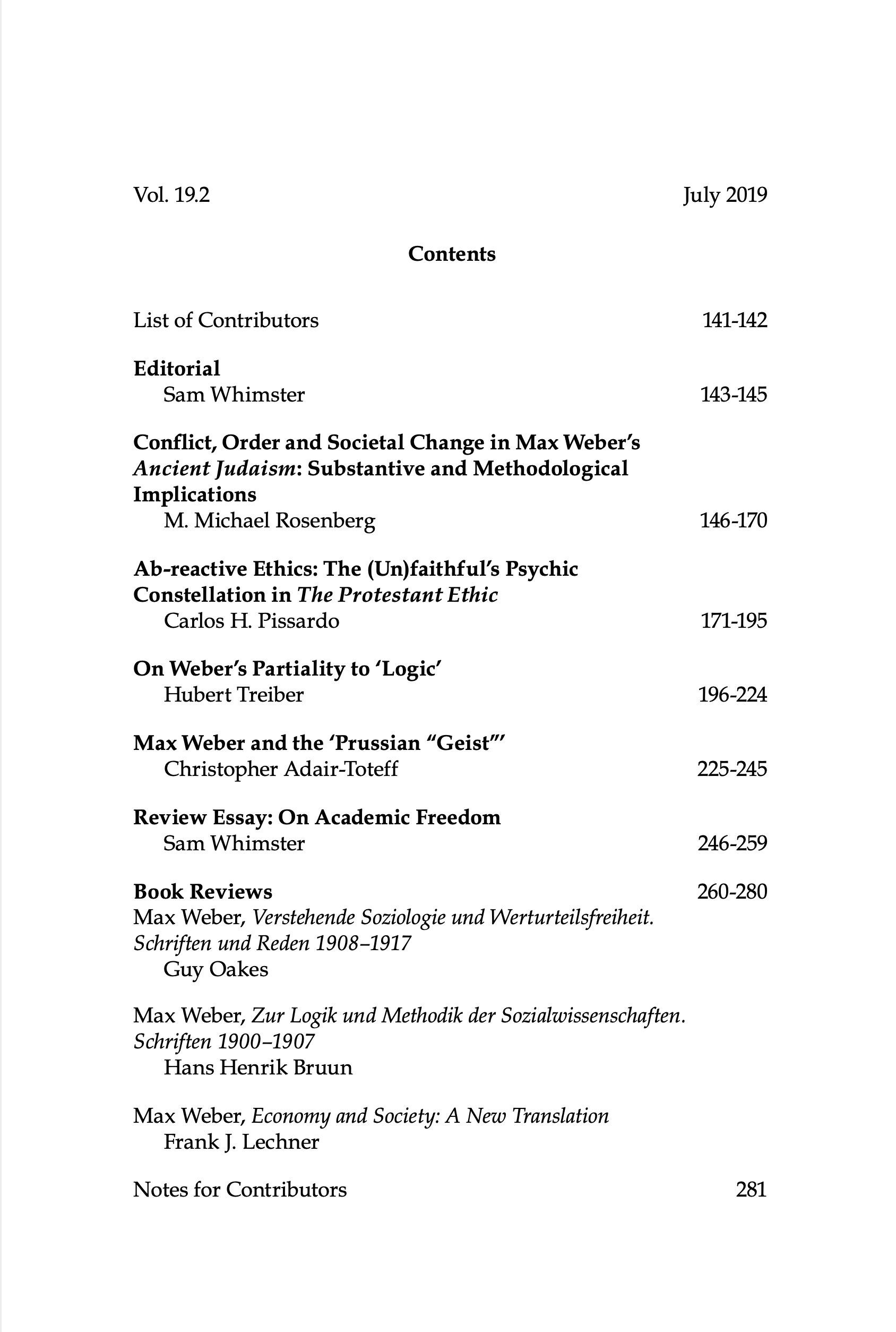
[MWS 19.2 (2019) 143-145] ISSN 1470-8078 doi: 10.15543/maxweberstudies.19.2.143
Editorial
Sam Whimster
The review section of this issue salutes the publication of three mighty volumes from the Max Weber Gesamtausgabe project. Two are on methodology, one is on universities and academic freedom. Hans Henrik Bruun honours the achievement as follows: ‘This book [Zur Logik und Methodik der Sozialwissenschaften. Schriften 1900–1907] vir- tually closes the majestic procession of volumes that constitutes the Max Weber Gesamtausgabe. We should be deeply thankful for the Gesamtausgabe, and properly mindful of the immense efforts which have gone into it over many years.’ He also adds ‘we can never take our classics for given, even when they come in definitive editions’.
In the field of Weber’s methodology there is now something of a consensus that there exists no hermeneutic appetite to reveal a uni- fied theory of methods in the social sciences. We now have all of Weber’s methodological writings at our disposal in a critical-historical edition, so may the work of application and development continue, albeit piecemeal. That said, it is interesting to combine the volume on universities (Hochschulwesen und Wissenschaftspolitik. Schriften und Reden 1895–1920) whose major theme is the assertion of academic freedom (Lehrfreiheit) with the two volumes on methodology. (The other volume on methodology is Verstehende Soziologie und Werturteils- freiheit. Schriften und Reden 1908–1917, edited by Johannes Weiß, and here reviewed by Guy Oakes.) The study and articulation of the mul- tiple topics of ‘objectivity’, value judgements, facts, theory and ideal types, intepretation, causation, and the presuppositions of science and so on is only viable to the extent that the university as an institu- tion is secure in its own autonomy. At this point we arrive at ‘Wissen- schaftslehre’—Marianne Weber’s preferred term. The reference back to Fichte’s lectures at Berlin under the same heading was explicit for Marianne Weber. The foundation of a university in Berlin in 1810 on the principles laid down by the minister of education, Wilhelm von
Max Weber Studies
Humboldt, was integral to the creation of a nation. And those prin- ciples were the three freedoms of teaching, learning and research (Lehrfreiheit, Lernfreiheit, and Freiheit der Forschung). Weber pole- mised that this legacy was being corrupted by the Prussian ministry of education of his day. The challenge to uphold academic freedom and the autonomy of the university remains.
Also in the review section is the publication of a major new trans- lation by Keith Tribe of the First Part of Economy and Society. Com- parisons with the translation of Talcott Parsons—who called his, misleadingly, The Theory of Social and Economic Organization—will pro- vide a fertile subject for discussion, not least on the sense and appli- cation of Weber’s apparatus of concepts.
Michael Rosenberg notes how sparse the demonstration of those late E&S concepts and ideal types are in the field of empirical stud- ies. But Ancient Judaism which appeared at the same time provides a demonstration of Weber’s late methodology. ‘Particularly instructive in this respect is his depiction of the interrelations among the ideal types of traditional, charismatic and legal rule (Herrschaft) over the course of ancient Israel’s history, as well as his account of the dynamic re-orientation of the religious and societal orders emerging out of con- flicts among Israelite social strata.’ From this we can derive a Webe- rian theory of societal change.
Carlos Pissardo takes up Weber’s innovative application of the early Freud’s concept of abreaction. Weber blew his top (in a letter to Else Jaffé, 1907) over Dr. Otto Gross’s therapeutic application of abre- action theory—hold nothing back, let everything be expressed. Gross argued that it was possible to reach a new libertarian ethics by reject- ing repression and freely abreacting emotional constraints. In con- trast Weber argued in The Protestant Ethic and the Spirit of Capitalism that religion ‘places certain psychological premiums (not of an eco- nomic character) on the maintenance of the attitude prescribed by it, premiums which, so long as the religious belief remains alive, are highly effective’. The demands of active worldly asceticism placed on Protestants operates as a ‘means of ab-reacting feelings of religious anxiety.’ But the main psychological effect of that last disenchantment theorized by Weber in 1920 is not melancholy but anxiety.
Weber studied law, first as a university student (for some nine years) and then later as a sociologist in his contribution(s) to the so- called Second Part of Economy and Society. He did not follow his father into the profession of lawyer. For Weber the study of law was an intellectual exercise, no more so than in the pursuit of the idea of ‘a
Editorial
logically coherent system of rules, free of logical contradiction and in principle without gaps.’ Weber of course argues such a system can never be reconciled with the substantive reality of law in particular situations. With the aid of recent juristic scholarship Hubert Treiber explores the intellectual drivers of systematization. One looks in the first instance to the didactic texts of Roman law, like the Institutes of Gaius (161 ce). But this was something of a crammer for law students, published after many hundreds of years of sacred-ritual law. The lat- ter’s irrationalities did however involve abstract categories, rather in the same way as English law developed through notions like trespass and equity. (N.B. in both cases the difficulty of nailing down a cate- gory of property as possessive ownership.) But abstract categories are not sufficient for system. Systematization is the achievement of the reception of Roman law, as in the cases of the medieval Italian towns, jurisprudence as a university subject in its own right, its import into canon law, and its reception in the modern era as in the Napoleonic code. Treiber analyses these complexities with the intellectual aid of conceptual jurisprudence and the ‘logicisation of the law’.

 Latest Issues
Latest Issues Submission
Submission Archive
Archive